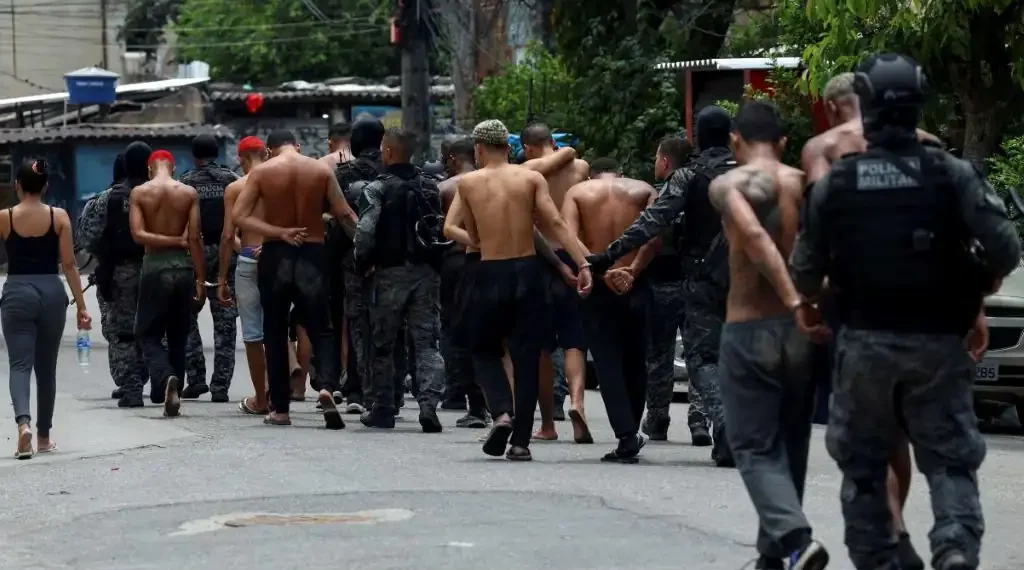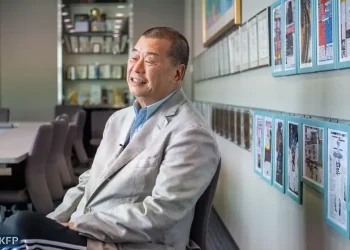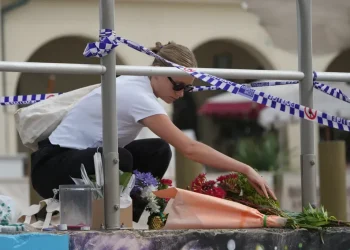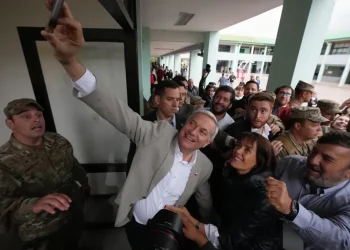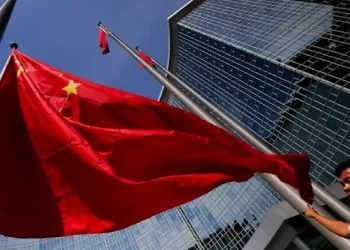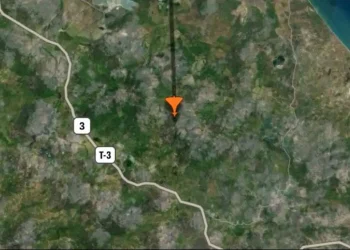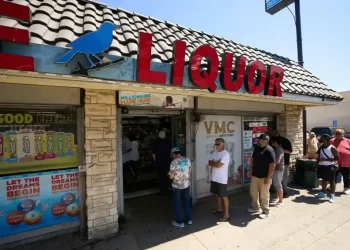At least 64 people were killed during a large-scale police operation against organized crime in Rio de Janeiro on Tuesday, marking one of the deadliest raids in Brazil’s recent history. Officials confirmed that four police officers were among the dead, while dozens of others were injured.
Rio de Janeiro Governor Cláudio Castro said security forces seized a large cache of narcotics and 42 assault rifles during the raid, which targeted the Comando Vermelho (Red Command), Brazil’s oldest and most powerful criminal organization. The operation, involving more than 2,500 officers, has drawn both praise for its scale and criticism for its high human toll.
Massive Operation Targets ‘Red Command’ Network
Authorities said the operation was more than a year in planning and aimed to disrupt the territorial control of the Red Command in northern Rio’s sprawling Alemão and Penha communities. The gang, which originated in the 1970s among leftist prisoners during Brazil’s military dictatorship, has since evolved into a transnational criminal network engaged in drug trafficking and extortion across South America.
Governor Castro called the operation “the biggest in the history of Rio de Janeiro,” describing it as a decisive step in confronting what he termed “narco-terrorism.” He urged residents of affected neighborhoods to remain indoors while security forces continued clearing operations.
Heavy Clashes and Drone Attacks Reported
The state government said at least 81 suspects were arrested during the raid. Officials also accused gang members of using drones to attack police positions — a tactic that highlights the increasingly militarized nature of urban gang warfare in Brazil.
Videos posted on social media appeared to show drones releasing projectiles on security forces in the Penha Complex, one of the city’s most violent zones. Despite the attacks, officials said police remained “steadfast in the fight against crime.”
Reuters footage showed thick plumes of black smoke rising from the Alemão favela as armored vehicles moved through narrow streets lined with burning barricades. Residents later reported destroyed cars and damaged homes as a result of the crossfire.
US and UN Issue Warnings and Condemnation
The U.S. State Department issued an advisory urging travelers to avoid northern Rio due to “ongoing fighting between police and criminal factions” that disrupted traffic and public transport.
The United Nations Human Rights Office said it was “horrified” by the scale of violence, warning that the incident reflected “the extreme lethal consequences of police operations in Brazil’s marginalized communities.” The agency called on authorities to conduct “prompt and effective investigations” in accordance with international human rights law.
Recurring Violence in Brazil’s Favelas
This week’s deadly raid follows a series of violent confrontations between police and drug factions in Rio’s favelas. Earlier this year, a similar operation in Alemão left five people dead. The governor said the latest crackdown surpassed the intensity of the city’s infamous 2010 security crisis.
According to the Fogo Cruzado Institute, which monitors armed violence in Brazil, over half of all recorded gunshot injuries in September 2025 occurred during police operations.
In 2021, a police incursion in the Jacarezinho favela killed 25 people and triggered a Supreme Court order limiting such raids during the COVID-19 pandemic to “absolutely exceptional circumstances.” Human rights groups argue that despite legal restrictions, heavy-handed tactics have continued, disproportionately affecting poor communities.
International Scrutiny Ahead of Global Climate Summit
The timing of the operation has drawn additional attention, coming just days before Rio de Janeiro hosts the C40 World Mayors Summit — a major international climate conference. Critics noted that large police raids often coincide with major global events as authorities seek to project a sense of order.
Governor Castro, however, defended the timing, insisting the operation had been planned for months and was not linked to the summit. “This is about restoring security to our communities,” he said.
A Persistent Challenge for Brazil’s Security Policy
Despite decades of military-police interventions, Rio de Janeiro remains one of Brazil’s most violent states, with criminal groups controlling vast territories. Analysts say repeated cycles of raids and retaliation have done little to dismantle entrenched networks of corruption and organized crime.
Security experts argue that without social investment and reform in policing practices, operations of this scale risk perpetuating instability. “Each time the state enters with force, communities are left more traumatized, and trust erodes further,” said one Rio-based criminologist cited by local media.
As investigations continue, Brazil faces renewed pressure from international observers and domestic civil rights organizations to balance its war on organized crime with its human rights obligations.
This article was rewritten by JournosNews.com based on verified reporting from trusted sources. The content has been independently reviewed, fact-checked, and edited for accuracy, neutrality, tone, and global readability in accordance with Google News and AdSense standards.
All opinions, quotes, or statements from contributors, experts, or sourced organizations do not necessarily reflect the views of JournosNews.com. JournosNews.com maintains full editorial independence from any external funders, sponsors, or organizations.
Stay informed with JournosNews.com — your trusted source for verified global reporting and in-depth analysis. Follow us on Google News, BlueSky, and X for real-time updates.
